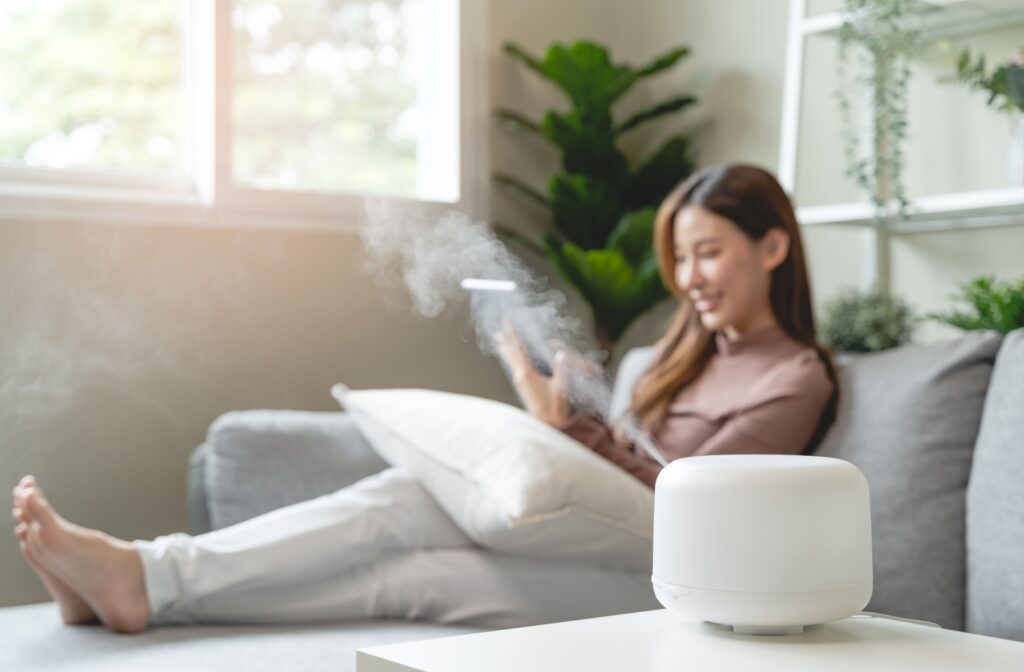Have you noticed your eyes feeling increasingly dry and irritated lately? If so, you’re certainly not alone.
Dry eyes have become a widespread issue, particularly as we spend more time staring at screens and in controlled indoor environments, such as offices with air conditioning or homes with central heating
These settings significantly reduce the moisture in the air, which can increase eye dryness and discomfort. But did you know that there’s a straightforward solution that could help alleviate these symptoms?
Introducing a humidifier into these environments can significantly increase the humidity levels, providing much-needed relief for dry, irritated eyes.
By restoring moisture to the air, a humidifier can help maintain the natural lubrication of your eyes, making it an effective and simple remedy to this modern-day problem.
What Is Dry Eye?
Dry eyes occur when your eyes don’t produce enough tears or produce poor-quality tears. Tears are essential for maintaining the health of the front surface of the eye, providing clear vision, and they serve as a protective barrier of our eyes—shielding them from allergens, bacteria, and foreign objects. Without adequate lubrication, you might experience:
- Discomfort
- Stinging
- Blurred vision
Dry eyes can be more than just a minor annoyance. Left untreated, they may lead to inflammation and damage to the surface of your eyes.
Common Causes of Dry Eyes
Dry eye can stem from various factors, many of which are surprisingly common.
- Environmental conditions, such as wind, smoke, or dry air
- Spending long hours staring at computer screens also tends to reduce blinking, which is crucial for keeping your eyes moist.
- Aging, as tear production tends to decrease after age 50.
- Certain medications, including antihistamines and antidepressants, can also reduce tear production.
Symptoms of Dry Eyes
Common symptoms of dry eyes include:
- A stinging or burning sensation
- A feeling of having something in your eyes
- Episodes of watery eyes, which is the body’s response to the irritation of dry eye
- Redness and stringy mucus in or around your eyes are also common
You might also experience increased sensitivity to light, difficulty wearing contact lenses, and trouble with nighttime driving. These symptoms can vary in severity but often lead to significant discomfort and disruption in daily activities.
Using a Humidifier for Dry Eyes
Humidifiers add moisture to the air, which can be particularly beneficial in dry indoor environments. When the air is dry, your tears evaporate more quickly, leading to dry eyes.
By maintaining an optimal humidity level in your living spaces, you can help keep your eyes moist and comfortable.
Using a humidifier can also improve overall air quality, which is beneficial for your respiratory health. This added moisture helps prevent the drying of mucous membranes, contributing to a more comfortable living environment.
Additionally, if you’re someone who spends a lot of time indoors, especially during the winter months when heating systems dry out the air, a humidifier can be a game-changer for your eye health.
Choosing the Right Humidifier
When selecting a humidifier, consider the size of the room where you’ll be using it. Larger rooms may require a more robust unit, while smaller spaces can benefit from compact models. Look for a humidifier with adjustable settings to control the humidity level.
Consider features like ease of cleaning and maintenance, as a dirty humidifier can harbor mold and bacteria, potentially worsening your symptoms. Ultrasonic humidifiers are often quieter and more energy-efficient compared to their evaporative counterparts.
Lastly, assess whether you need a cool-mist or warm-mist humidifier. Both types can be effective, but warm-mist models are often better at killing bacteria and mold, while cool-mist humidifiers are generally safer for homes with children and pets.

Additional Tips for Managing Dry Eyes
While a humidifier can significantly help, it’s also important to adopt other practices to manage dry eyes effectively.
- Make sure to blink regularly, especially when working at a computer, to keep your eyes lubricated.
- Using artificial tears or lubricating eye drops can provide immediate relief. Choose preservative-free options to avoid potential irritation from long-term use.
- Wearing sunglasses outdoors can protect your eyes from wind and sun, reducing evaporation of tears.
- Maintain a healthy diet rich in omega-3 fatty acids, found in fish and flaxseed, which can improve tear quality.
- Staying hydrated by drinking plenty of water also supports overall eye health.
When to See an Optometrist for Dry Eyes
Dry eyes can significantly impact your quality of life, but the good news is that there are effective solutions available. Using a humidifier can provide relief by adding moisture to the air, helping to prevent the evaporation of your natural tears.
If you experience persistent dryness, discomfort, or vision problems, it may be time to consult an optometrist. They can diagnose the underlying cause of your dry eyes and recommend appropriate treatments.
How Eye Lab Can Help Dry Eyes
At Eye Lab, we offer customized treatment plans tailored to each patient’s specific dry eye concerns. Our approach includes in-office treatments, home therapy, prescription medications, nutritional supplements, and a 12-month monitoring period to ensure long-term relief.
Our exclusive 12-month monitoring program ensures that 100% of our patients do not experience flare-ups in that window. Regular check-ins and adjustments to your treatment plan keep your eyes comfortable and healthy year-round.
Take the first step towards healthier eyes today. Book an appointment with our experienced team at Eye Lab in Scottsdale and discover the best solutions for your dry eyes.





